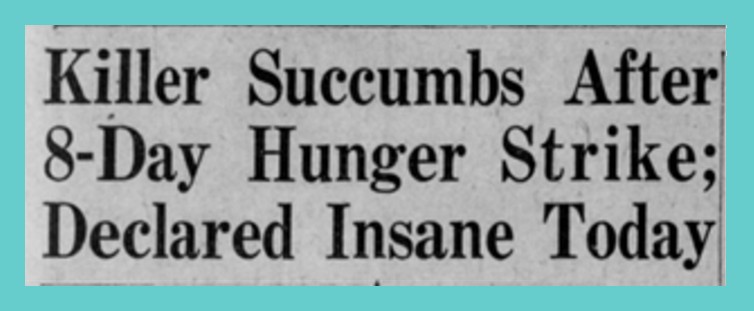 A story appeared in the Harrisburg Evening News, 1 March 1937, describing the death at the Dauphin County Prison, Harrisburg, Pennsylvania, of Clair Guy Wingert who was accused killing William H. McElwee. Clair Guy Wingert, a trapper from the area around Clarks Valley, Dauphin County, claimed that the persons he fired shots at, McElwee and his wife, had poisoned his toe. Today’s post is the sixth of a multi-part series in which newspaper images and articles of the time are used to describe the affair.
A story appeared in the Harrisburg Evening News, 1 March 1937, describing the death at the Dauphin County Prison, Harrisburg, Pennsylvania, of Clair Guy Wingert who was accused killing William H. McElwee. Clair Guy Wingert, a trapper from the area around Clarks Valley, Dauphin County, claimed that the persons he fired shots at, McElwee and his wife, had poisoned his toe. Today’s post is the sixth of a multi-part series in which newspaper images and articles of the time are used to describe the affair.
Killer Succumbs After 8-Day Hunger Strike; Declared Insane Today
Clair Guy Wingert, 51, Clarks Valley hunter and trapper, on a hunger strike ever since he was committed to the Dauphin County Prison on Saturday, 20 February 1937, on a charge of slaying one of his “best friends” and critically wounding another, died of exhaustion early this afternoon. Wingert was found dead in his cell about 1:30 o’clock, a little more than an hour after a lunacy commission had declared him insane and possessed of criminal tendencies.
Warden D. W. Fahnestock said Wingert had refused to partake of any food since he had been brought to the prison within a few hours after he allegedly fatally wounded William McElwee and critically wounded Mrs. McElwee while the three were at breakfast in the McElwee home in Clarks Valley. The prisoner, Warden Fahnestock said, was served soup, specially prepared for him, after the lunacy commission left his cell about noon, but this had been untouched when Guard John Leonard found Wingert dead.
Acted Strangely
Dr. Howard Milliken, county coroner, who was called, said he had been told Wingert was “violently insane.” Neighbors in Clarks Valley, following the shooting, said Wingert, familiarly known as “Huckleberry,” had acted “strangely” at times.
Wingert, who had acted violently at intervals since being committed to prison, was declared insane by Dr. E. M. Green, former superintendent of the Harrisburg State Hospital, and Dr. Max Levine, a member of the staff, who examined the prisoner in his cell this morning.
Could Not Be Moved
Wingert was so weak this morning that he could not be moved from his cell to the room in the prison where prisoners are usually examined, and the doctors went to his cell with Fred C. Morgan, assistant district attorney. Morgan was preparing a petition to present to the court asking for Wingert’s immediate removal to a State hospital for the insane when he was informed of the prisoner’s death. Morgan declared that Wingert was “extremely emaciated” from his constant refusal to touch food or water.
The report of the commission was announced as the widow of McElwee, Mrs. Dorothy [Strickler] McElwee, 23, continued to battle for her life in the Harrisburg Hospital. Mrs. McElwee, wounded three times by bullets allegedly fired by Wingert, has shown little progress toward recovery.
A checkup at the Clerk of Courts Office today reveled that Wingert had served a seven-month jail term in the county prison in 1917 after being convicted on a charge of shooting at his brothers, William Wingert and Percy Wingert.
Wingert, who was living at the home of a Mrs. Dietrich with his mother on 11 February 1917, fired on his brothers with a shotgun when they went to the Dietrich home to get bedclothing after they removed their mother, who was ill at the time, to Percy Wingert‘s home.
According to the transcript of the case, Wingert fired down a back stairway at the Dietrich home, shooting the hat from the head of one brother.
The brother William Wingert was killed several weeks ago in a mine accident at Williamstown.
_____________________________________
For other parts of this series, see: The Poison Toe Murder, 1937.
News articles are from Newspapers.com.